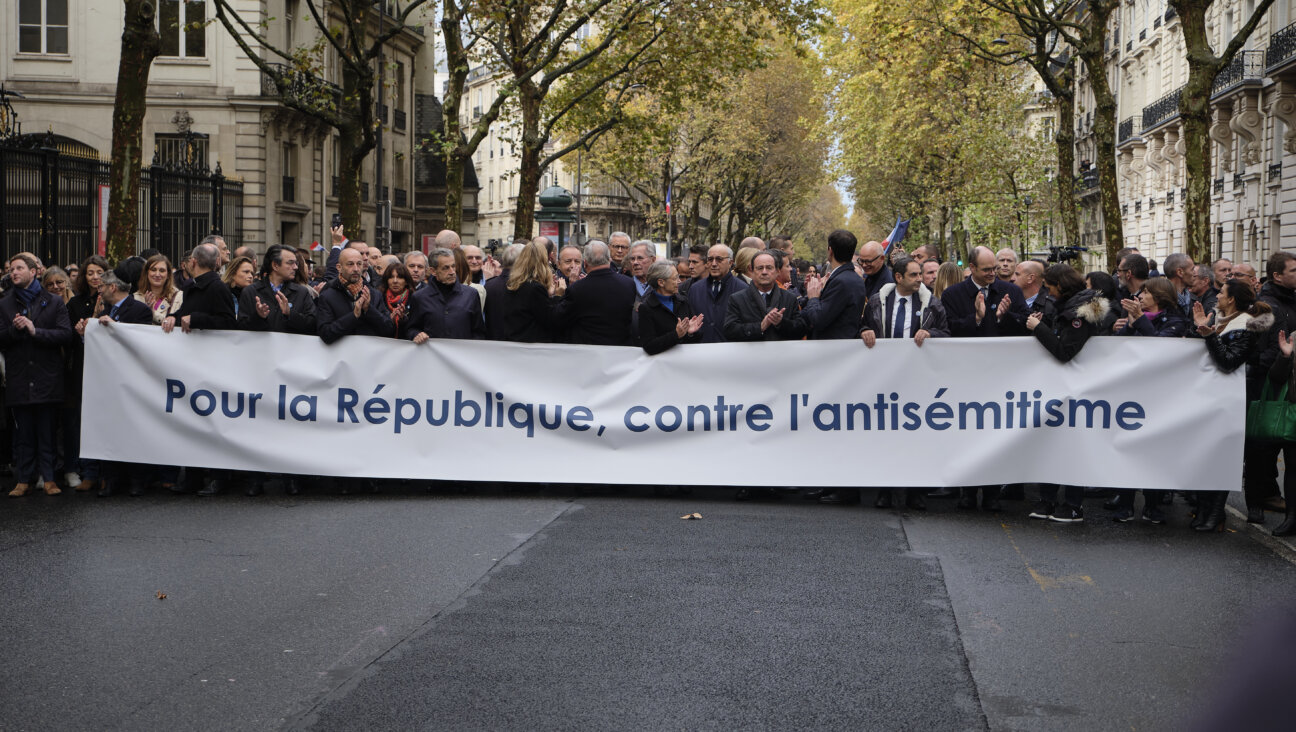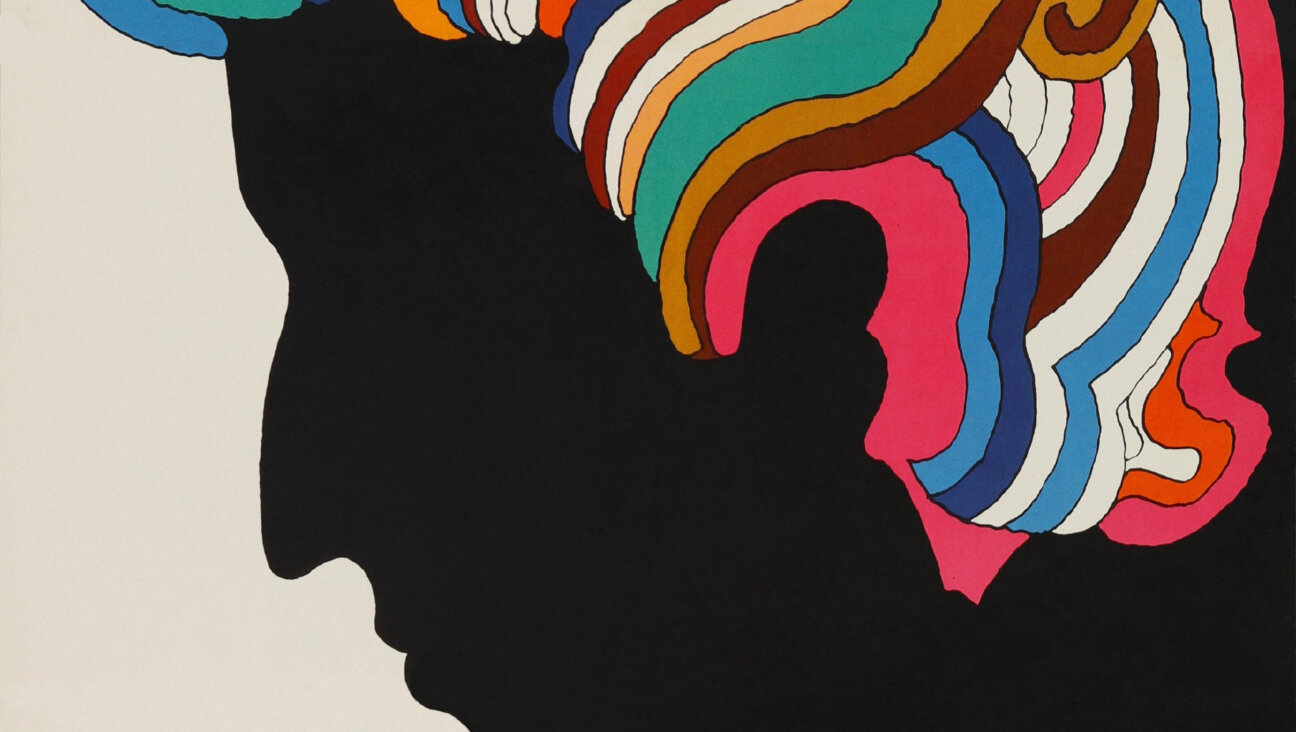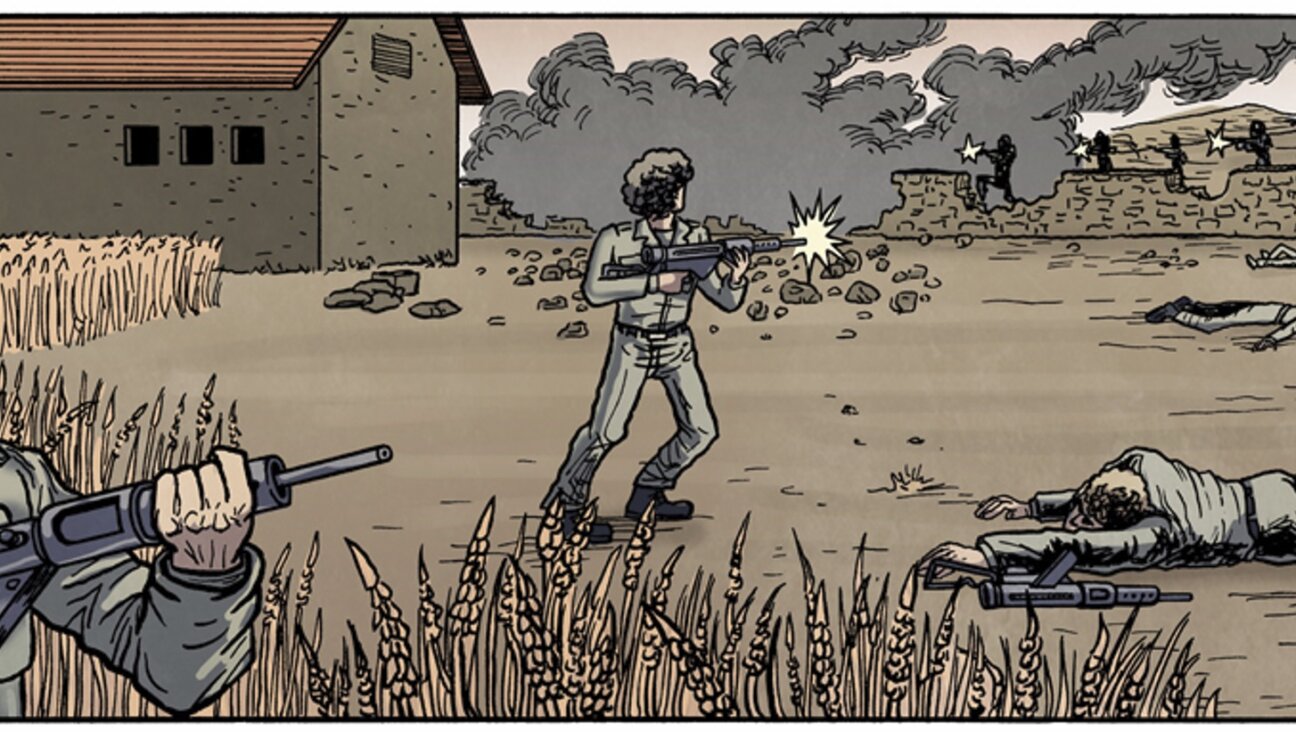These 16 Jewish Heroes Rescued Books From The Jaws Of The Censors

Books on Fire Image by iStock
It started in 1982.
A former reference librarian named Judith Krug was working as the director of the Office of Intellectual Freedom for the American Library Association. It was Reagan time in America, the era of televangelist Jerry Falwell and his Moral Majority. Falwell had recently put out a letter, suggesting that “Our Bodies, Ourselves,” “The Catcher in the Rye,” “Forever” and a slew of other books didn’t belong in school libraries. Around the same time, the American Civil Liberties Union was fighting the school board of Island Trees, New York, to put banned books such as “Soul on Ice,” by Eldridge Cleaver and Bernard Malamud’s “The Fixer” back on the shelves. It had been only two years since Reagan had taken office, and the number of censorship cases in America had already tripled.
“It’s not just the anti-sex education people,” Krug told The Washington Post at the time. “All sorts of people are trying to keep out things that they don’t approve of, including feminists and anti-feminists, blacks, Jews, single-issue groups.”
In response, a national coalition, led by Krug, initiated “Banned Books Week,” to focus on protecting literature that would-be censors deemed objectionable. 37 years later, Banned Books Week is still a thing, which is both a tribute to its founders’ commitment and a sad commentary on the fact that, even in 21st Century America, the war against censorship goes on. The ALA’s most recent list of challenged and banned literature includes books that contain profanity, LGBTQIA+ characters, or anti-police themes. Banned Books Week runs from September 22-28 this year. To observe this celebration and defense of purportedly controversial books, we’re profiling some of our community’s most outspoken opponents of censorship.
RABBI ISRAEL H. LEVINTHAL: Defiant Spiritual Leader

Inaugural Dinner: Among the attendees of the December, 1934, launch of the American Library of Nazi-banned books was Albert Einstein (right). The event was covered in The Forward. Image by Forward Association
The ravages of censorship and the heroism sometimes required to fight it can be told in the story of the Brooklyn Jewish Center, a once-thriving cultural mecca in Crown Heights. The building still stands at 667 Eastern Parkway as the educational institute Oholei Torah. Here, in December of 1934, in response to the plague of Nazi book burnings, the center, under the leadership of Rabbi Levinthal, inaugurated the American Library of Nazi-Banned Books, offering “unceasing defiance to Nazi brutishness and witnessing the indestructible life of the human spirit.”
The library was the second of its kind, the first being the Paris-based German Freedom Library, also known as the “Library of Burned Books.” According to Nikola von Merveldt, writing in 2007 for Library Trends, the advisory board included Upton Sinclair, Theodore Dreiser and Albert Einstein, who was one of two featured speakers at the library’s inaugural dinner along with Rabbi Levinthal. “You may burn books, but the letters of the books are indestructible,” Levinthal said in his speech entitled “The Book Versus the Sword.” Levinthal, who became the spiritual leader of the Brooklyn Jewish Center in 1919, remained in that role until his death in 1982 at the age of 94. As for the fate of the library, which became less of a priority for the Brooklyn center as the extent of Nazi barbarism became known, its holdings were ultimately donated to the Jewish Theological Seminary. Only one item was left behind — a manuscript about Unified Field Theory that was found in a safe in 1979. Its author was Albert Einstein.
MORRIS ERNST: Savior Of Ulysses

Morris Ernst Image by Library of Congress
The 1933 case was called “The United States V. One Book Called ‘Ulysses.’” At issue was James Joyce’s day in the life of Leopold Bloom, which, in 1921, had been deemed obscene by New York’s Court of Special Sessions, which fined Margaret Anderson and Jane Heap for publishing “Ulysses” in the Little Review. As a result, “Ulysses” had, for all intents and purposes, been banned in the United States. Resurrecting “Ulysses” became the project of Random House co-founder Bennett Cerf and Morris L. Ernst, the son of an Alabama peddler, who went on to work as general counsel for the ACLU. Ernst successfully argued before Judge John M. Woolsey that “Ulysses” was not pornographic but instead, a work of literary merit. In its 1976 obit for Ernst, The New York Times reported that Ernst’s success in the “Ulysses” case yielded an unexpected windfall for the lawyer: In place of a fee, Ernst received royalties for the book he defended. In a fascinating deep-dive into the history of the “Ulysses” case, Michael Chabon writes in The New York Review of Books, “the history of the ACLU is a history of great struggle, bitter and glorious. But it is also—it is first of all—a history of great lawyers, like Morris Ernst, who brought as much artistry and erudition and sly, masterful skill to defending one book, called ‘Ulysses,’ as its author had brought to its creation.
CHARLES REMBAR: Defender Of His Faith

Merry Christmas, Mr. Lawrence: A scene from the 1955 film adaptation of “Lady Chatterley’s Lover,” by D.H. Lawrence. Image by gettyimages
If he hadn’t been the cousin of Norman Mailer, things might have turned out a whole lot differently for Rembar, a lawyer and literary agent, who helped Mailer sidestep would-be censors of “The Naked and the Dead” by suggesting he use “fug” instead of that verb’s more-familiar spelling. Rembar, the New Jersey-born product of Harvard, the U.S. Army and Columbia Law, would later successfully defend Henry Miller’s “Tropic of Cancer,” John Cleland’s “Fanny Hill” and D.H. Lawrence’s “Lady Chatterley’s Lover,” which, according to Rembar, “devoted more of its pages to the act of sex…than anything ever before sold over the counter.” “Censorship is old, as old as history,” Rembar wrote in his optimistically-titled book “The End of Obscenity.” “The idea that the government should not interfere with freedom of speech—should even protect it — has been with us only a few centuries.” Rembar died in 2000 at the age of 85.
BARNEY ROSSET: The Most Dangerous Publisher

Mugwump: Art inspired by David Cronenberg’s adaptation of “Naked Lunch,” by William S. Burroughs. Image by Getty Images
For a time, Rosset was known as “the most dangerous man in publishing.” He was born the son of a banker in 1922 in Chicago, where his best childhood friend was cinematographer and photographer Haskell Wexler. “I’m half-Jewish and half-Irish, and my mother and grandfather spoke Gaelic. From an early age, my feelings made the I.R.A. look pretty conservative,” Rosset told AP in 1998. “I grew up hating fascism, hating racism.” As publisher of Grove Press and founder of the Evergreen Review, Rosset introduced American audiences to the work of Samuel Beckett, Jean Genet, Herbert Selby Jr., Malcolm X, and the Beats. In a life filled with controversy, Rosset gained the greatest notoriety for publishing D.H. Lawrence’s “Lady Chatterley’s Lover,” Henry Miller’s “Tropic of Cancer” and William S. Burroughs’s “Naked Lunch,” which led to legal battles between Rosset and the U.S. Postal Service, the Supreme Court and the Supreme Judicial Court of Massachusetts. In his memoir, “My Life In Publishing and How I Fought Censorship,” Rosset wrote that he wanted to be remembered as “the publisher who broke the cultural barrier raised like a Berlin Wall between the public and free expression in literature, film and drama.”
JEROME LAWRENCE: A Censored Opponent Of Censorship

Inherit The Wind: The 1960 film about the Scopes Monkey Trial starred Spencer Tracy and Fredric March. Image by Getty Images
No, there’s nothing Jewish at all about the key figures in the famed Scopes “Monkey Trial” of 1925, in which Tennessee high school teacher John T. Scopes went to trial for teaching the theory of evolution from a biology textbook. The case pitted Clarence Darrow, an agnostic, against William Jennings Bryan, a notably fiery Protestant. But the reason we know this case as well as we do is largely because of “Inherit the Wind,” the 1955 play that dramatized the trial, written by Robert E. Lee and Jerome Lawrence, aka Jerry Schwartz. The play was adapted for a 1960 film starring Fredric March and Spencer Tracy. In a remembrance of Lawrence, who died in 2014 at the age of 88, Violet Spevack recalled in the Cleveland Jewish News that the author credited his passion for social justice to his Jewish upbringing. As co-writer of one of the most famous scripts about censorship and freedom of censorship, Lawrence saw his own work censored a great many times when creationists sought to shut down productions of his play, which had been written in response to McCarthyism. “We were indignant, appalled at thought control in the mid-’50s,” Mr. Lawrence told The New York Times in 1994. “So we went back in history to another case where people were being told what to learn, what to think, and it did have a great effect on the country.”
JUDGE SAMUEL EPSTEIN: Upholder of Law

Family Photo: Judge Samuel Epstein (left) with his wife Lotte and son Elliott. Image by Courtesy of Ed Pearlman
When Judge Epstein died in 1991 at 101, the Chicago Tribune recalled in its obituary that the Chicago Council of Lawyers did not generally approve of judges working past the age of 70. “However,” the Council wrote in 1977 when Judge Epstein had been a spry 87, “We will make an exception in the case of Judge Epstein.” Epstein was born in Lithuania in 1889; after he and his family immigrated to America, Epstein’s father, Ezriel Epstein, became Chicago’s chief Orthodox rabbi. Epstein served as a judge for more than 30 years, and said that one of his proudest moments on the bench came when he handed down a decision exonerating “Tropic of Cancer” and its author Henry Miller from charges of obscenity. “Let the tastes of the readers determine what they may or may not read; let each reader be his own censor; but let not the government or the courts dictate the reading matter of a free people,” Epstein wrote. The decision won the praise of speech advocates everywhere, though other less high-minded individuals were unimpressed. According to Epstein’s great-nephew, Ed Pearlman, Chicago mayor Richard J. Daley told the judge, “Sam, you’re a bad boy.”
BEATRICE LEVIN: Teacher Of Salinger

Eternal Subject of Controversy: Beatrice Levin ran afoul of school administrators in Tulsa for teaching “The Catcher in the Rye.” Image by gettyimages
Levin was a prolific author of articles and books, among them a 1946 history of Jews in theater based on research she conducted while studying at the University of Wisconsin at Madison. But it is another author’s book with whom Levin is most associated: “The Catcher in the Rye,” by J.D. Salinger. In 1960, Levin was a high school teacher at Edison Preparatory High School in Tulsa, Oklahoma, where she ran afoul of school administrators for teaching Salinger’s novel, a perennial target for censors. According to “Battle of the Books,” Lee Burress’s study of censorship in American public schools, Levin was not the only teacher to incur the wrath of her superiors for teaching “Catcher”; an instructor in Louisville, Kentucky, was reportedly fired that same year for the same reason. According to a 1960 article in Time Magazine, Tulsa’s school superintendent Charles Mason said he found the book “shocking,” but left the decision of whether to retain Levin up to the school’s principal who decided to keep Levin on but get rid of the book. Levin resigned.
ALLEN GINSBERG: Witness For The Defense

He Saw The Best Minds Of His Generation: Allen Ginsberg — poet and champion of liberty. Image by Getty Images
“I am Jewish; and I should be offended. What Burroughs is doing, he is parodying this monster; he is parodying this anti-semite…Don’t you realize he is making a parody of the monstrous speech and thought processes of a red-necked Southern, hate-filled type, who hates everybody?” Those words were spoken by Ginsberg in 1966 in the Massachusetts Supreme Court on behalf of William S. Burroughs’s novel “Naked Lunch,” which had been banned four years earlier. Ginsberg, along with fellow author Norman Mailer, had been called as a witness to testify on behalf of the book. This was hardly Ginsberg’s first encounter with censorship. Ginsberg’s “Howl” had been targeted in 1957 by U.S. Customs, which seized copies of the poem being imported from England. And, both City Lights owner and poet Lawrence Ferlinghetti and bookseller Shig Murao were arrested that same year for selling “Howl” to an undercover cop. Throughout his life, Ginsberg fought censorship not only in the U.S. In 1985, he was one of a group of writers who called out the Soviet Union for imprisoning writers. “I also put in a plug for gay rights, but that didn’t go over too big,” Ginsberg told the Washington Post at the time. And in 1988, as vice-president of PEN, Ginsberg criticized Israel for the suppression of reading material in the West Bank and Gaza. Not long before he died in 1997, Ginsberg told the Harvard Gay & Lesbian Review, “The censorship of language is the censorship of consciousness.”
LEANNE KATZ: Feminist Crusader
From the day it was founded in 1974 until she died in 1997 at the age of 65, the National Coalition Against Censorship was headed by Katz. The coalition was started at the ACLU where Katz had been working, and according to Katz’s obituary in The New York Times, defended such authors as Maurice Sendak, Robert Cormier, Madeline L’Engle and even Geoffrey Chaucer when their books were removed from classrooms and libraries. Throughout her career, Katz found herself speaking out not only on behalf of authors, but also of filmmakers and artists, including Robert Mapplethorpe. Additionally, she spoke out against anti-pornography crusaders who she saw as harming women with their paternalistic policies. “Censorship only protects ignorance,” Katz told the Christian Science Monitor in 1984. “We must arm our young people with tools for understanding and thinking about problems. And we don’t do this by shutting them off from ideas or discouraging critical thinking.”
NADINE GORDIMER: Fierce Opponent Of Apartheid

Banned In South Africa: Nobel Prize-winning author Nadine Gordimer had three of her novels banned in her native country. Image by Getty Images
At the height of censorship in apartheid South Africa, Nobel Prize-winning author Gordimer saw three of her books banned, including the anti-apartheid novels “July’s People” and “Burger’s Daughter.” The South African Publications Board declared that the latter book violated the country’s Publication Act of 1974. “The authoress uses Rosa’s story as a pad from which to launch a blistering and full-scale attack on the Republic of South Africa (and) its government’s racial policies,” the board wrote. “The whites are the baddies, the blacks the goodies.” Gordimer, the daughter of a Jewish watchmaker, would go on to become a vice-president of PEN. “Writers are not taken seriously in America — they’re regarded as entertainers,” she told Michiko Kakutani of The New York Times in 1986. “And in Eastern Europe and the Soviet Union, they’re taken so seriously that sometimes they can’t be published at all. In South Africa, as writers, I doubt whether we have any influence on the Government at all. But I do think South African fiction writers, if we’ve been of any use at all, have helped rouse and raise the consciousness of the outside world to the long-term effects of life in our country. To put it very simplistically, a newspaper account, however good, tells you what happened. But it’s the playwright, the novelist, the poet, the short-story writer who gives you some idea of why.” Gordimer died in 2014 at the age of 90.
JUDITH KRUG: Warrior Against Censorship
Krug, who passed away in 2009 at the age of 69, founded the Freedom to Read Foundation and was perhaps this country’s most vocal and visible warrior in the battle against book censorship. “If I have an agenda, it is protection of the First Amendment. Libraries in this country cannot operate unless we can stand foursquare on the First Amendment,” told American Libraries back in 1995. “And if that becomes a partisan position, well, okay, I guess if I have to be partisan I will be partisan on behalf of the First Amendment.” Today, the Judith F. Krug Memorial Fund provides grants for organizations planning events during Banned Books Week. In its 2009 obituary for Krug, the JUF News called Krug a “hero to librarians.”
JUDY BLUME: A Challenging Author

A Challenging Author: Judy Blume Image by Getty Images
”It came with the election, the presidential election of 1980,” Blume told NPR’s Neal Conan in 2016. “The next day, I’ve been told, the censors were crawling out of the woodwork and challenging, like ‘it’s our turn now, and we’re going to say what we don’t want our children to read.’” Blume, whose father was a New Jersey dentist, holds the dubious distinction of having had more of her books challenged or banned than any other author. In the first decade of the 21st century, the American Library Association compiled a list of the Top 100 banned or challenged books — Blume wrote four of them: “Forever,” “Blubber,” “Tiger Eyes” and “Are You There God, It’s Me Margaret,” the latter of which is currently being adapted for film. In a 2014 interview conducted by Lena Dunham for The Telegraph, Blume recalled her reaction to the censorship of her books: “My thoughts were: this is America, we don’t ban books here! But of course I know a lot better now. And I wasn’t the only one. But when you say to me, ‘No, you can’t do this,’ I say, ‘Oh yes, I can!’”
HAROLD PINTER: Ally Of Salman Rushdie

The Playwright’s The Thing: When a bounty was placed on Salman Rushdie’s head, Harold Pinter was one of the author’s most ardent defenders. Image by Getty Images
In 1989, after “The Satanic Verses” was published and the Iranian government placed a $2.6 million bounty on the head of its author Salman Rushdie, who was forced to go into hiding, one of the author’s most vocal defenders was the playwright (and son of a Jewish dressmaker) Pinter. Pinter co-authored letters defending Rushdie’s purportedly blasphemous book, and led a delegation to British prime minister Margaret Thatcher’s residence, insisting that the government give Rushdie full protection. Pinter, whose plays would grow more pointedly political as his career went on, told reporters at the time, “The government has a responsibility to protect its citizens and make it clear it will not tolerate that. The government can make some serious statements and take some serious action. It should confront Iran with the consequences of its statement.” While Rushdie remained in hiding, Pinter delivered a speech that Rushdie had written entitled “Is Nothing Sacred?” “Wherever in the world the little room of literature has been closed, sooner or later the walls have come tumbling down,” Pinter said, quoting Rushdie. In 2014, Rushdie was awarded the PEN/Pinter prize, given to authors who show “fierce intellectual determination to define the real truth of our lives and our societies.”
LESLÉA NEWMAN: Front Line Soldier In The Culture Wars

Champion of Representation: Leslea Newman attends the 7th Annual PFLAG National Straight For Equality Awards Gala. Image by Getty Images
When The Forward last checked in with Newman earlier this year, she talked with us about her most recent children’s book: “Gittel’s Journey: An Ellis Island Story.” The book is based on stories she heard from her grandmother and her aunt about their journeys to America. But Newman is still probably best known for “Heather Has Two Mommies,” the sweet, life-affirming children’s story that Newman self-published back in 1989 when no mainstream publisher would take on a book about the titular girl and her lesbian moms. The book ignited the ire of conservative groups throughout America. In 1993, Georgia lawmakers wanted to move the book to the adult section of public libraries. A school board in Queens tried to remove “Heather” from a recommended reading list. “Throughout the ’90s there were many, many instances of people using the book for their own political agendas,” Newman told Publishers Weekly in 2014 on the 25th anniversary republication of the book. “On Christian TV there was someone saying my book was the work of the devil. It was astonishing.” Still, the success and ultimate acceptance of Newman’s book does speak to some progress that has been made since the publication of “Heather.” Though it was named one of the American Library Association’s most-challenged books in the 1990s, it hasn’t appeared on that list in a decade.
DAVID LEVITHAN: Author and Activist

A Yen For Activism: David Levithan, author of “Two Boys Kissing.” Image by Getty Images
In the fall of 2018, the public library in Rumford, Maine, received a letter co-signed by three local pastors, who took issue with a banned books display. “The library should not be promoting a far left view that sees homosexuality as acceptable,” the letter declared. “The library is not to be an adult bookstore, but a family resource. The pastors drew attention to one book in particular — “Two Boys Kissing,” which has made the American Library Association’s “Top Ten Most Challenged Books List” three out of the past four years. The book — which concerns two teenage boys who attempt to break the Guinness world record for longest kiss — is the work of David Levithan, the New Jersey-born author, whose books include “Wide Awake,” “Every Day,” “Someday” and “Nick and Norah’s Infinite Playlist,” which he co-wrote with Rachel Cohn. His novel “Wide Awake” featured America’s first gay, Jewish president. “I don’t think there is even remotely an obligation of an author to be an activist,” Levithan told School Library Journal in 2016. “I respect any colleague who does not want to do that, but for me, that’s always been part of my writing. If you believe that books can help make the world better, then I’m totally up for getting out there and doing that.”
SUZANNE NOSSEL: Freedom Fighter

Suzanne Nossel Image by PEN
During “Banned Books Week” this year, PEN America will be directing its focus onto what it sees as one of the biggest battles in the censorship fight — book banning in the American prison system, where, according to PEN, prisoners are denied access to literature including legal materials and dictionaries. At the heart of this campaign is Nossel, PEN’s executive director who came to the organization by way of Amnesty International, the U.S. State Department and Human Rights Watch. “Tens of thousands of books are banned in prisons,” Nossel told a reporter earlier this month. “Systems ban access to everything from classics including Alice Walker’s ‘The Color Purple’ and Toni Morrison’s ‘Paradise,’ to coloring and self-help books. These restrictions are stunningly arbitrary and defeat the ability of incarcerated people to learn, explore and envision a future. We call on states and the federal government to lift these pointless bans and uphold the freedom to read.” Nossel partially credits her many fights for social justice to the story of her maternal grandparents who fled Nazi Germany for South Africa. “Looking back to what first sparked my own interest in human rights issues,” Nossel told the Jacob Blaustein Institute for the Advancement of Human Rights in 2012, “It has everything to do growing up as an American Jew.”
This article has been updated from a previous version (“These 15 Jewish Heroes Rescued Books From The Jaws Of The Censors”






















